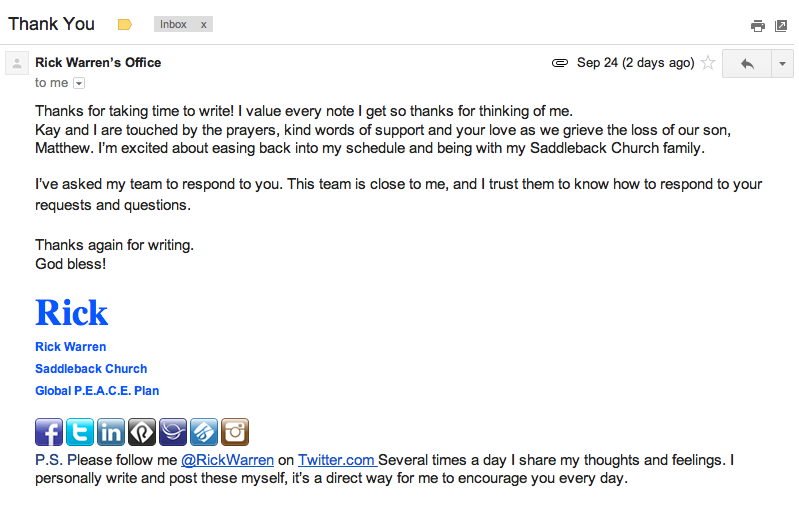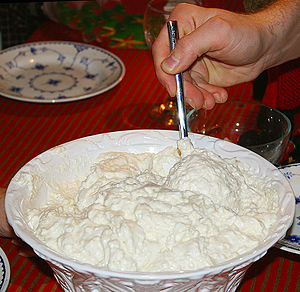I guess this is it. This. Warren has apologized.
There is no smug, self-satisfaction in this, sisters and brothers. Reconciliation comes with time and more often than not at great cost. This is no picnic or attempt at building a reputation or platform at the expense of someone else.
A wonderful opportunity to engage publicly, because that is where this whole thing started, on cross-cultural skills and integration in mission, in the Gospel, was missed. Poof. Context, words, forum, influence matter. They are not “secular” things we Christians need not worry about. Jesus knew his audience, context, words, power of place and space. (If you’re not sure about this, I would be thrilled to walk you through a manuscript study of the book of Mark.)
For those of you just tuning in, please start here and then I would suggest going here, here or here. This is Day Four, and in social media time that means you are probably late to the party. Here is a quick synopsis.
- Monday morning Rick Warren posts an image of a female Red Guard with the caption. “The typical attitude of Saddleback Staff as they start work each day.”
- Hours later there are many, many Facebook posts by people concerned about the use of the image, evoking the horrors of the Cultural Revolution, and trying to connect that with a church staff’s attitude. There are also commenters rebuking people for communicating their hurt and concern over the image.
- By 8:30 am Monday morning, Warren responds with this: People often miss irony on the Internet. It’s a joke people! If you take this seriously, you really shouldn’t be following me! Did you know that, using Hebrew ironic humor, Jesus inserted several laugh lines – jokes – in the Sermon on the Mount? The self-righteous missed them all while the disciples were undoubtedly giggling!”
- By Tuesday afternoon Warren’s controversial post, image and comment thread and tweet connected to that thread are erased, which is why I have chosen to leave all images and posts, and to quote directly when possible.
- Tuesday night I sent him a personal email so that I could Matthew 18 the situation.
- Tuesday night I received what appears to be a standard response indicating that there will be a response to me forthcoming. As of this morning (Thursday), there is not.

Automated response. I get it. I really do. I don’t have followers or a congregation. I have three kids. My automated response is, “In a minute.”
I am going to break this down for clarity sake because I and others who have been vocal about this have been accused of being un-Christian, mean, thin-skinned, sensitive, unaware of how much Warren’s ministry has done, racist, stupid, and all sorts of things we grown-ups hopefully are not teaching the children in our midst to call other children. I am breaking it down because sometimes, as a bicultural woman, I think I am being direct, but, because of multiple cultural influences on my language and approach, folks who lean more towards the Western culture find my Asian American tendencies indirect. Let’s break this down and put this puppy to rest. I’ve been here before. I suspect I will be here again. Every time I learn something new.
So, here is the dilemma. Do I think so highly of myself to think that Warren’s apology and reference to an email is actually about me? That is ridiculous. I know there were others who emailed him. But for the sake of argument, let’s assume Warren is talking about my email, which I re-read. I never say “I am offended”. I had a lot of questions because I wanted to understand. I wanted to hear and open up dialogue because I didn’t understand Warren’s logic, humor or joke. I really didn’t understand why Warren’s supporters would then try to shut down those who were offended (and I include myself in the camp of those hurt, upset, offended AND distressed) by telling us/me to be more Christian like they themselves were being.
There is no “if”. I am hurt, upset, offended, and distressed, not just because “an” image was posted, but that Warren posted the image of a Red Guard soldier as a joke, because people pointed out the disconcerting nature of posting such an image and then Warren then told us to get over it, alluded to how the self-righteous didn’t get Jesus’ jokes but Jesus’ disciples did, and then erased any proof of his public missteps and his followers’ mean-spirited comments that appeared to go unmoderated.
I am hurt, upset, offended, and distressed when fellow Christians are quick to use Matthew 18 publicly to admonish me (and others) to take this issue up privately without recognizing the irony of their actions, when fellow Christians accuse me of playing the race card without trying to understand the race card they can pretend doesn’t exist but still benefit from, when fellow Christians accuse me of having nothing better to do than attack a man of God who has done great things for the Kingdom.
When apologizing you do not put the responsibility of your actions on the person who is hurt, upset, offended, or distressed. You do not use the word “if”. You do not communicate that the offense was to one person when, in fact, it was not. You clarify and take the opportunity to correct those who mistakenly followed your lead. Your apology is not conditional on the “if” because you should know because you have listened, heard, and understood the person you hurt, upset, offended, or distressed.
A dear, wise friend offered this rewrite:
“I am truly sorry for my offensive post and the insensitive comments that followed. Thank you for teaching me what I did not know. I need to be surrounded by people like you, who bring a perspective and experience I lack, so I can continue to learn.”
Words matter.
There is no smug, self-satisfaction in this, sisters and brothers. This was not a pissing contest. This was and still is a wonderful opportunity to engage publicly and privately on cross-cultural skills and integration in mission.


